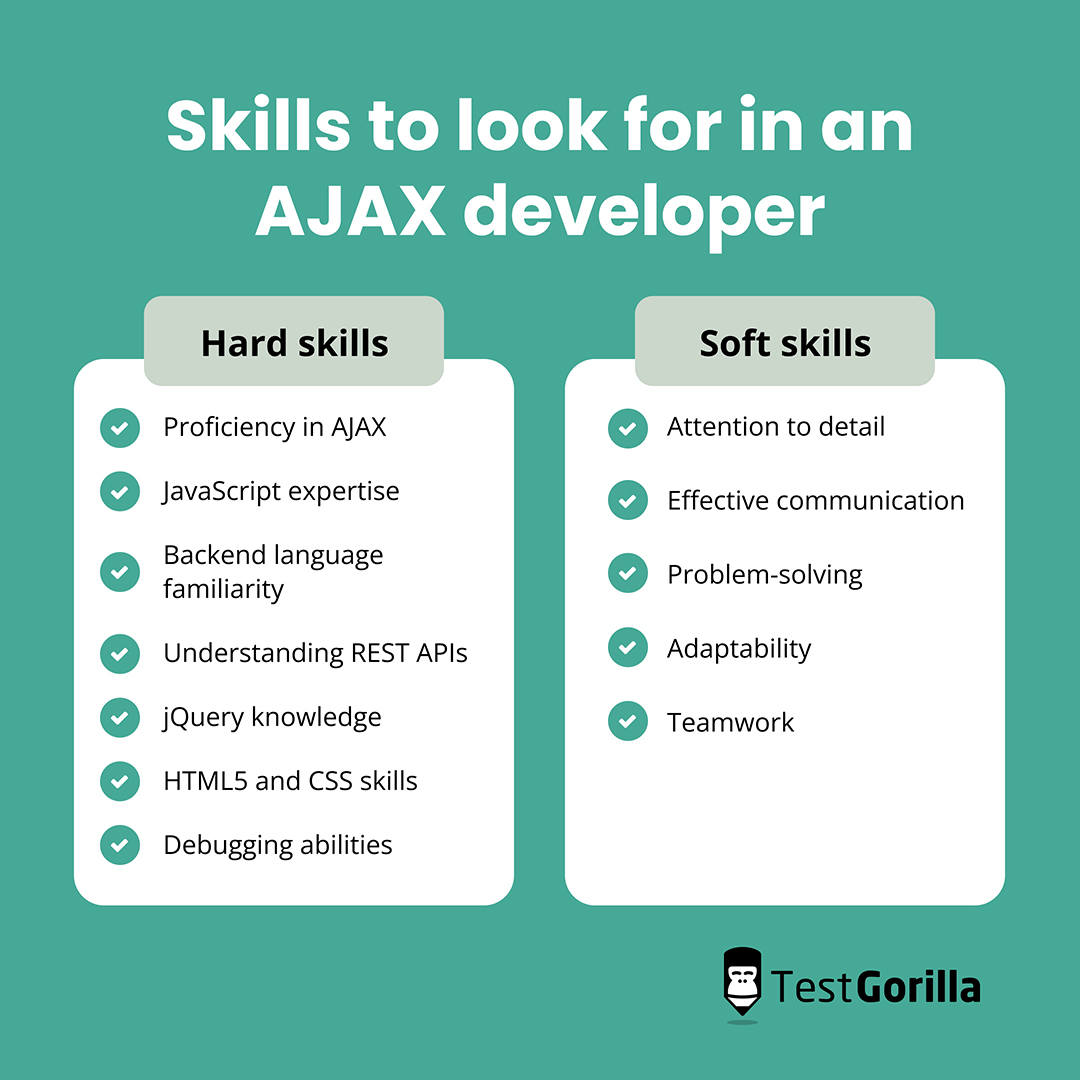Hiring a skilled AJAX developer can speed up your web applications and make your website more responsive, which is crucial for a smooth user experience and boosting customer engagement and revenue.
Conversely, making a poor hiring choice can result in slow, buggy applications that drive users away. The ripple effects can include increased costs and project delays, harming your company's reputation.
This guide covers all the essentials for hiring AJAX developers, from finding top talent and identifying essential skills to accurately evaluating candidates so you make the right hire.
What do you need to know before hiring an AJAX developer?
You'll be better prepared to find an AJAX developer who fits your needs and contributes positively to your projects if you lay some groundwork first. Let's dig in.
Understand the core AJAX technologies
AJAX stands for Asynchronous JavaScript and XML. It isn't a stand-alone language but a combination of multiple technologies including HTML, CSS, and JavaScript. You should familiarize yourself with these core elements so you’ll be able to gauge the skills you seek in your candidates.
Be aware of the current market rate for AJAX developers
The compensation you offer is a significant factor for attracting or deterring potential candidates. Research the current market rate for AJAX developers in your area. Websites like Glassdoor or Payscale can provide valuable insights. Payscale lists the average base salary for AJAX developers in the US as $74,000 per year.
Consider other forms of compensation to make the offer more attractive, such as stock options, flexible work hours, or physical wellness programs.
Decide on contract vs full-time employment
Depending on your project's needs, you may opt for a contract-based AJAX developer or a full-time employee.
Contract developers are suitable for short-term projects but may not be invested in the long-term success of your company. Full-time employees may require a more extensive onboarding process but are often more committed and can provide long-term value.
Evaluate the project's complexity
The complexity of your project will also dictate the level of expertise you need. For simpler projects, an entry-level AJAX developer may suffice. But for more complex tasks involving multiple API integrations, real-time data processing, or elaborate UI/UX designs, you'll want someone with more experience.
Consider the team dynamics
Last but not least, think about how your new hire will fit within your existing team. Will they be working closely with backend developers, UI/UX designers, or directly under a project manager? Understanding these dynamics will help determine the technical and soft skills needed for effective collaboration.
Skills to look for in an AJAX developer
Hard and soft skills matter in identifying an AJAX developer who's technically adept and a good team fit. Here's a blend of skills unique to the role:
Hard skills
Proficiency in AJAX: A strong understanding of Asynchronous JavaScript and XML and how to use them to update a web page without reloading it.
JavaScript expertise: Exceptional skills in JavaScript are required, as it's the language at the heart of AJAX.
Backend language familiarity: A grasp of server-side languages like PHP, Python, or Ruby, to interact with the server in an AJAX operation.
Understanding REST APIs: Ability to use REST APIs to fetch or send data to the server.
jQuery knowledge: Proficiency in jQuery for simplifying common AJAX techniques.
HTML5 and CSS skills: Solid grounding in HTML5 and CSS for front-end development.
Debugging abilities: Strong debugging skills, especially in browser environments, to quickly identify and fix issues.
Soft skills
Attention to detail: AJAX work is precise. One tiny error can cause part of a web page to fail, so attention to detail is essential.
Effective communication: The ability to clearly express technical ideas to non-technical team members is invaluable.
Problem-solving: Skilled in finding optimal solutions to web performance issues that may arise.
Adaptability: Willingness to learn new technologies and techniques as they evolve, which is crucial in the fast-moving world of web development.
Teamwork: Ability to collaborate efficiently with other developers and designers in the team.
The best insights on HR and recruitment, delivered to your inbox.
Biweekly updates. No spam. Unsubscribe any time.
Where to find skilled AJAX developers
AJAX development is a specialized skill not all developers have. But, the ones who do are in high demand. So, how do you find your candidates? Let's explore.
Online coding communities: Websites like GitHub and Stack Overflow are great places to spot talent. Developers often share code, answer questions, and discuss AJAX-specific topics there.
Tech meetups and hackathons: Virtual tech meetups on sites like Major League Hacking and MeetUp allow you to see how developers perform in real time.
Industry journals and blogs: Experts often write articles or tutorials about AJAX in publications like Developer.com. Keep an eye out for authors who display deep understanding or innovative uses of AJAX.
Freelance platforms: Websites like Toptal or Upwork have filters that let you search for AJAX-specific developers. This can be a good quick start to hiring if you need someone immediately.
College and university job boards: Many students specialize in specific technologies. Post on the job boards of schools with strong computer science programs, like Stanford, MIT, and Caltech.
Social media: Using platforms like LinkedIn or Twitter can yield good results. Use hashtags related to AJAX and development, such as #AJAX, #JavaScript, and #AsyncJS, to find potential candidates.
Five creative ways to find AJAX developer candidates
Sometimes, it pays to think outside the box. Here are some other ways to find excellent AJAX developers:
AJAX webinar series: Host an online webinar on an AJAX-related topic. It not only helps educate but also attracts talent interested in AJAX.
Open source contribution: Start or sponsor an open-source AJAX project. Developers interested in these projects are skilled in AJAX and could be potential hires.
JavaScript forums: Forums that discuss JavaScript, like the jQuery forum or Coderanch, are full of expert AJAX developers who might be open to new job opportunities.
Remote talent: Don't limit your search to your local area. The beauty of tech jobs is that they can often be done from anywhere. Remote work opens up a much larger pool of candidates. To attract them, offer flexible work hours and the freedom to choose their work environment.
Referral program: Sometimes your own employees are your best scouts. Offer incentives to staff for referring AJAX developers they know or have worked with.
How to select the best AJAX developer candidates
TestGorilla's multifaceted approach takes the guesswork out of hiring, which means you’ll be more likely to find candidates with the technical expertise and personality traits that align with your company's needs.
Our article on how to assess front-end developer skills can provide you with additional guidance. Follow these steps for a successful hiring process:
Step 1: Start with pre-interview testing
Before you even glance at resumes, initiate the hiring process with pre-employment testing. This eliminates bias and gives a clear picture of a candidate's abilities.
Use the AJAX test at the core of your assessment to measure the key skills needed for AJAX development roles. The results will give you initial data to weed out candidates who don't meet your minimum tech skill requirements.
Step 2: Add complementary tech skills tests
AJAX doesn't operate in isolation; it often works alongside other technologies like CSS and HTML5. To ensure your candidates have a well-rounded skill set, consider adding HTML5 and REST API tests. There are more than 300 tests to choose from in TestGorilla’s extensive library.
Step 3: Evaluate personality and culture fit
Technical skills aren't everything. You also want to know if a candidate will mesh well with your team and align with your company culture. Include personality tests like culture add and motivation to gain insights into these aspects.
Step 4: Customize the assessment
You know your company's needs better than anyone. Tailor your assessment further by adding custom questions that probe into unique skill sets or experiences you're looking for in an AJAX developer.
Step 5: Use one-way video interviews
Time is valuable. Use TestGorilla's one-way interviews to pose questions relevant to AJAX development. Candidates can answer when it suits them, and you can review the responses on your schedule.
As you prepare for your interviews, you may find these web design interview questions helpful.
Step 6: Review comprehensive candidate reports
After candidates complete the tests and interview, you’ll receive a detailed report from TestGorilla. This combines tech skills, personality, and any other custom criteria you set. The information will give you a rounded view of each candidate, helping you make a data-driven decision.
Common mistakes when hiring an AJAX developer
When you're in the market to hire AJAX developers, there are several pitfalls you should avoid to ensure you get the right talent.
Overlooking XMLHttpRequest and Fetch API knowledge: These are core to AJAX functionality. If a candidate doesn’t show proficiency here, they won’t be able to handle AJAX tasks effectively.
Ignoring Cross-Origin Resource Sharing (CORS) issues: AJAX developers often work with APIs and should understand how to handle CORS issues to ensure data can safely cross domain boundaries.
Not testing for asynchronous programming skills: An AJAX developer must be skilled in writing asynchronous code to handle data without blocking the user interface.
Downplaying JSON knowledge: While AJAX isn’t limited to JSON, it’s a commonly used data format. Make sure the candidate is comfortable working with JSON data structures.
Overvaluing general JavaScript skills: Yes, AJAX uses JavaScript, but the specifics of AJAX development are unique. Ensure your tests focus on AJAX-specific tasks rather than generic JavaScript questions.
Forgetting soft skills: AJAX developers almost always work as part of a team, so skills like communication, teamwork, time management, and dependability are just as important as technical abilities.
Start hiring the best AJAX developers with TestGorilla
Securing a proficient AJAX developer requires keen attention to their technical and soft skills, qualifications, and the platforms where you find them. It's important to prioritize their technical understanding, experience, and capability to adapt to evolving project demands.
TestGorilla streamlines your hiring process making it easier to hire developers with strong AJAX skills. Our platform provides a robust pre-employment testing stage, ensuring a fair and skills-based selection right from the get-go.
For a higher chance of landing a developer who resonates with your project needs, explore these benefits further by signing up for a free TestGorilla plan.
You've scrolled this far
Why not try TestGorilla for free, and see what happens when you put skills first.















